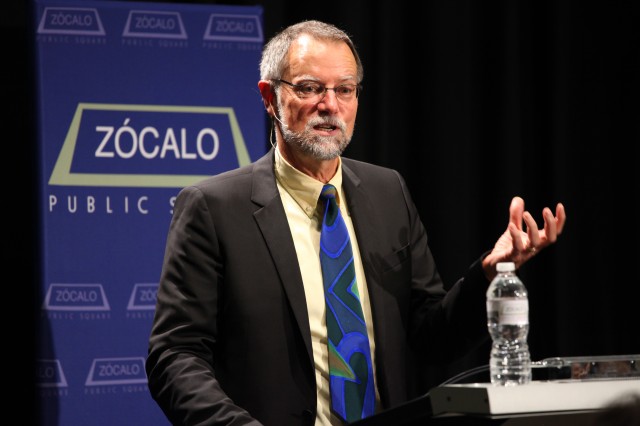
“In a hundred years’ time, if we poll a majority of professional economists, they’ll say, most of them, that Charles Darwin was the founder of our discipline–not Adam Smith.”
So said Robert Frank, author of The Darwin Economy: Liberty, Competition, and the Common Good, in an evening talk full of provocative statements that challenged the accuracy of conventional economic wisdom and contemporary political conversation. Among them: that the country can bring in revenues and revive its economy without demanding too much more from middle-income taxpayers.
“I’m going to try to sell you some snake oil tonight,” Frank told the capacity crowd at the Goethe-Institut Los Angeles. “I’m going to try to persuade you that we could make a few simple changes in tax policy that would liberate about $2 or 3 trillion a year, without requiring any painful sacrifices from any citizen.”

Frank said that “fiscal alchemy” would provide a way for the U.S. to pay off debts and rebuild its crumbling infrastructure. That alchemy: more government spending and a new tax policy. John Maynard Keynes said that it would be better for the economy to hire people to dig holes and fill them back up again than to do nothing in a depression–hole diggers make a wage, spend it, and businesses in turn hire people to fill demand for products. What’s easy about the current moment is that one doesn’t have to invent a reason to hire hole diggers–because there are so many holes that need digging. The American Society of Civil Engineers estimates that the country needs $2.2 trillion worth of repairs to our infrastructure.
Frank challenged objections to this thinking on right and left. Politicians on the right claim that government spending will bankrupt our grandchildren, and prefer Adam Smith’s invisible hand–that of the free market–as a way to create the greatest happiness for the most people. What they ignore, Frank said, is that in bad times lower and lower prices create struggles for businesses and discourage hiring and investment–and thus undermine growth.
The left believes regulation will solve problems; this ignores the fact that fierce economic competition has not led to exploitation. Indeed, competition has produced, for example, Apple’s products.
And this is where Darwin entered the event. The economic competition described by Adam Smith resembles the struggle for resources–and survival–in nature.
Most significant for economics, Darwin realized that “when individual and group interests are in conflict, it’s individual interests that trump, to the detriment of the group,” Frank said.
Consider the bull elk, Frank suggested. Their antlers often span four feet and weigh 40 pounds, which provides an advantage over other elk in the mating game, but makes them easy prey for other animals. If all bull elks shrunk their antlers down by half, those with the biggest antlers would still be victorious–but as a group they would flourish more. Similarly, if one person in the Zócalo event audience stood up, said Frank, he’d be able to see better. But then everyone would eventually stand up, and the view would be the same as before.

Frank said this Darwinian principle applies to the labor market. Consider a parent who takes a riskier job in order to make more money to send his or her children to a good school in a more expensive neighborhood. The value of the income compensates the risk. But ultimately, a “good school” is relative to the other schools around it. Parents will end up bidding against one another to buy houses in these districts–and the workplace will get less safe as a result as those parents take riskier jobs.
“If I sell my safety for a house in a better district, and force you to do the same, we’ve both lost our safety–and don’t have anything to show for it,” he said. “There’s no presumption that when individuals do what makes sense to them that we’ll get results that make sense to us as a society,” he added.
This sort of competition makes the economy less efficient. For example, today people spend more on coming-of-age parties for their children, and on weddings, than they did in the past. They build houses that are larger than ever. But incomes aren’t significantly higher. People aren’t making more money. Frank doubted that these spending arms races were buying happiness; people are simply being forced to spend more to keep up with their neighbors.
His solution? “Rather than set up a complex bureaucracy to try to tell people what they can or can’t do, let’s just change the tax system,” Frank said.

By permanently eliminating the income tax, and instituting a progressive consumption tax in its place, he said that Americans would be able to work fiscal magic.
Just as is required now, everyone would report their income to IRS as well as their savings. The government would calculate each person’s taxable consumption–income minus savings, or how much was spent during the year, and then offer a sizable standard deduction. These would be taxed progressively, with extremely high rates at the top of the scale and lower rates at the bottom. The consumption tax, he claimed, would force people to save more and stop overspending.
In a lively question and answer session, the audience questioned how practical Frank’s proposal would actually be.
“I’m not asking people to change the culture,” Frank said. But he added that there are opportunities to advocate for taxes and improve policy at the same time. “If we’re doing too much of some things, make them more expensive. … Tax harmful activities. That’s the last word.”
Watch full video here.
See more photos here.
Buy the book: Skylight, Amazon, Powell’s.
Read expert opinions on whether taxes promote good behavior here.
*Photos by Aaron Salcido.




Send A Letter To the Editors